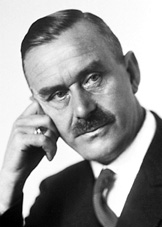Difference between revisions of "Thomas Mann"
m (1 revision) |
|||
| (One intermediate revision by the same user not shown) | |||
| Line 1: | Line 1: | ||
| + | [[File:thomasmann.jpg|200px|thumb|left|Thomas Mann]] | ||
| + | |||
==Country== | ==Country== | ||
| Line 13: | Line 15: | ||
==Notable Achievements== | ==Notable Achievements== | ||
| − | + | Nobel Prize | |
==Description== | ==Description== | ||
| − | + | Considered one of Germany's greatest writers of fiction and essays, winning the Nobel Prize in Literature in 1929. Forced to emigrate to Switzerland in 1933 due to harassment from the Nazis in Germany - the University of Bonn deprived him of his honorary Doctorate, but reinstated it in 1946. Eventually moved to the United States, and became a Professor at Princeton University, among others, then moved to California, returning to Switzerland in his later years. Notable books include 'Buddenbrooks'. Conflicting infatuations and desires inflect his work, also characterized by disappointments. His diaries reveal his struggles with bisexuality, which was reflected in his work (for example, in his book 'Death in Venice' (1912) which introduces same-sex desire). Had an intense personal relationship with violinst Paul Ehrenberg, as evidenced in his diaries. | |
| + | |||
| + | ==See Also== | ||
| + | |||
| + | * [[Nobel Prize Winners from the LGBTQ Community]] | ||
| + | |||
| + | ==Further Reading/Research== | ||
| + | |||
| + | * http://www.nobelprize.org/nobel_prizes/literature/laureates/1929/mann-bio.html | ||
| + | * http://www.theguardian.com/books/2008/jun/13/thomas.mann | ||
| + | * http://www.nytimes.com/books/97/09/21/reviews/mann-talk.html | ||
| + | |||
| + | <html><br /> | ||
| + | <a href="#" | ||
| + | onclick=" | ||
| + | window.open( | ||
| + | 'https://www.facebook.com/sharer/sharer.php?u='+encodeURIComponent(location.href), | ||
| + | 'facebook-share-dialog', | ||
| + | 'width=626,height=436'); | ||
| + | return false;"> | ||
| + | Share on Facebook | ||
| + | </a></html> | ||
Latest revision as of 14:10, 22 September 2024
Contents
Country
Germany
Birth - Death
1875 - 1955
Occupation
Writer
Notable Achievements
Nobel Prize
Description
Considered one of Germany's greatest writers of fiction and essays, winning the Nobel Prize in Literature in 1929. Forced to emigrate to Switzerland in 1933 due to harassment from the Nazis in Germany - the University of Bonn deprived him of his honorary Doctorate, but reinstated it in 1946. Eventually moved to the United States, and became a Professor at Princeton University, among others, then moved to California, returning to Switzerland in his later years. Notable books include 'Buddenbrooks'. Conflicting infatuations and desires inflect his work, also characterized by disappointments. His diaries reveal his struggles with bisexuality, which was reflected in his work (for example, in his book 'Death in Venice' (1912) which introduces same-sex desire). Had an intense personal relationship with violinst Paul Ehrenberg, as evidenced in his diaries.

